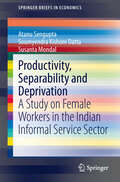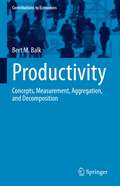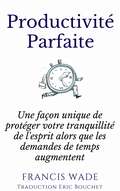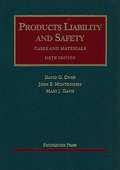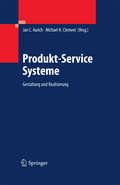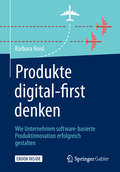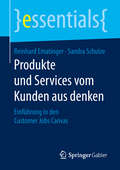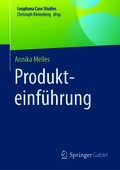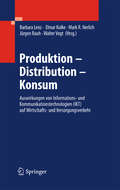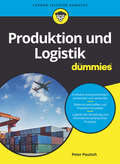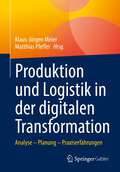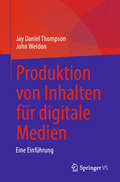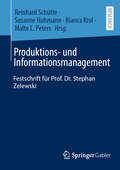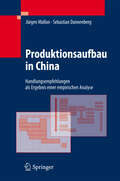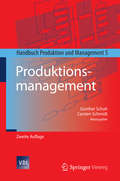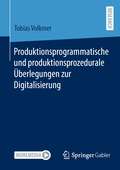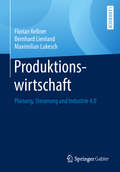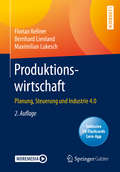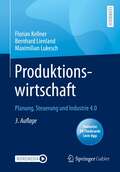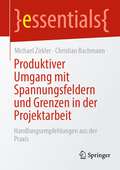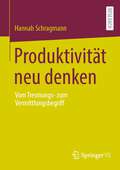- Table View
- List View
Productivity, Separability and Deprivation
by Susanta Mondal Soumyendra Kishore Datta Atanu SenguptaIn production and service sectors we often come across situations where females remain largely overshadowed by males both in terms of wages and productivity. Men are generally assigned jobs that require more physical work while the 'less' strenuous job is allocated to the females. However, the gender dimension of labor process in the service sector in India has remained relatively unexplored. There are certain activities in the service sector where females are more suitable than males. The service sector activities are usually divided into OAE and Establishments. In this work, an attempt has been made to segregate the productivity of females compared to that of males on the basis of both partial and complete separability models. An estimate has also been made of the female labor supply function. The results present a downward trend for female participation both in Own Account Enterprises (OAE) and Establishment. The higher the female shadow wage the lower their supply. This lends support to the supposition that female labor participation is a type of distress supply rather than a positive indicator of women's empowerment. Analysis of the National Sample Service Organization data indicates that in all the sectors women are generally paid less than men. A micro-econometric study reveals that even in firms that employ solely female labor, incidence of full-time labor is deplorably poor. It is this feature that results in women workers' lower earnings and their deprivation.
Productivity: Concepts, Measurement, Aggregation, and Decomposition (Contributions to Economics)
by Bert M. BalkThis book develops the theory of productivity measurement using the empirical index number approach. The theory uses multiplicative indices and additive indicators as measurement tools, instead of relying on the usual neo-classical assumptions, such as the existence of a production function characterized by constant returns to scale, optimizing behavior of the economic agents, and perfect foresight. The theory can be applied to all the common levels of aggregation (micro, meso, and macro), and half of the book is devoted to accounting for the links existing between the various levels. Basic insights from National Accounts are thereby used. The final chapter is devoted to the decomposition of productivity change into the contributions of efficiency change, technological change, scale effects, and input or output mix effects. Applications on real-life data demonstrate the empirical feasibility of the theory. The book is directed to a variety of overlapping audiences: statisticians involved in measuring productivity change; economists interested in growth accounting; researchers relating macro-economic productivity change to its industrial sources; enterprise micro-data researchers; and business analysts interested in performance measurement.
Productivité Parfaite - une façon unique de protéger votre tranquillité d'esprit
by Francis Wade Eric BouchetDe plus en plus d’exigences sur votre disponibilité - ceci est juste un fait de la vie moderne. Comment restez-vous au fait des attentes grandissantes sur votre capacité à répondre à toutes vos obligations, alors que vous faites le travail de plus d’une personne, tout en gérant une énorme quantité d’informations, et en réalisant que la technologie 24/24 ne fait qu’empirer les choses ? Avec ces pressions accrues, de quoi avez-vous besoin pour maintenir votre tranquillité d’esprit ? Ce livre est d’abord écrit pour les professionnels productifs qui ont déjà trouvé les moyens d’atteindre des résultats positifs. Ils ne sont pas incultes - le temps est une question importante, et ils ont su gérer leurs affaires suffisamment bien pour passer l’école, avoir un travail, gérer une famille, et avoir un certain confort matériel. Cependant, ils ont une inquiétude partagée: comment continuer à être efficace dans le futur, avec le rythme grandissant des changements qu’ils voient autour d’eux tous les jours ? Faire plus, pareil, ne semble pas la bonne réponse. Pas plus que les croyances populaires au sujet de la gestion du temps, ou la confiance collective dans des réponses globales. Le livre contient un grand nombre de suggestions spécifiques et pratiques sur des nouveaux comportements, mais le coeur du livre est une approche en quatre étapes qui préserve les avancées que vous, en tant que professionnel productif, avez déjà faites dans votre carrière. Etape 1 > Evaluer vos compétences actuelles par rapport aux standards d’excellence, et découvrir vos forces et opportunités d’amélioration. Etape 2 > Mettre des objectifs réalistes sur de nouveaux comportements, alignés avec vos objectifs et engagements. Etape 3 > Créer un plan à partir de ces objectifs qui vous laisse suffisamment de temps pour réussir, par petits pas. Etape 4 > Mettre en place un environnement qui soutie
Products Liability and Safety: Cases and Materials (Sixth Edition)
by Mary Davis David Owen John MontgomeryThe new edition of this classic casebook continues its long tradition of sensitively exploring products liability law and theory. The Sixth Edition includes significant new materials on such topics as design defects, warning defects, special issues on causation, federal preemption (including Wyeth v. Levine on pharmaceutical preemption), toxic substances (including important new material on medical monitoring), and punitive damages (including Philip Morris v. Williams). Daubert issues and the Products Liability Restatement are integrated throughout. Previous editions of this classic casebook have been adopted at over 100 law schools such as Harvard, Yale, Penn, NYU, Michigan, Duke, Georgetown, and Texas
Produkt-Service Systeme
by Jan C. Aurich Michael H. ClementBisher haben sich produzierende Unternehmen auf Entwicklung, Produktion und Vertrieb von Sachprodukten konzentriert, inzwischen fragen Kunden jedoch zunehmend komplette Problemlösungen nach. Unternehmen stehen vor der Herausforderung, den Wandel zum Full-Service Provider zu vollziehen. In dem Band wird ein Managementsystem zur Unterstützung von Planung, Entwicklung, Konfiguration und Realisierung von Produkt-Service Systemen (PSS) im erweiterten Wertschöpfungsnetzwerk vorgestellt und Methoden zur Organisation sowie zum Kompetenzerwerb aufgezeigt.
Produktbasierte Bewertung von Kundenbeziehungen im Maschinen- und Anlagenbau
by Marcel RöserFür eine zielorientierte Gestaltung von Geschäftsbeziehungen sind fundierte Kundeninformationen nötig. Hierzu ist eine Bewertungsmethodik vorzuschlagen, die grundsätzlich entscheidungslogisch korrekte Kundeninformationen liefert. Marcel Röser entwirft in diesem Band eine Bewertungsmethodik für Kundenbeziehungen im Maschinen- und Anlagenbau, die prinzipiell auf einer produktbasierten Lebenszyklusrechnung aufbaut und die sukzessive weiter ergänzt und verfeinert wird. Neben die ohnehin in einer Lebenszyklusrechnung erfassten produktbezogenen sachlichen Nachlaufeffekte treten weitere Einflussgrößen, u. a. die Folgeprojekte des betrachteten Kunden, das Cross-Selling-Potenzial, das auf andere wirkende Referenzpotenzial sowie die Kundentreue. Dies erfordert, mehr als andere kostenrechnerische Aufgaben, zugleich eine adäquate Risikoberücksichtigung und die Integration von Risikopräferenzen in die Bewertung von Entscheidungsvorschlägen. Der Lösungsansatz über die simulative Berechnung von Kundenrisikoprofilen ermöglicht es, insbesondere vorliegende Erkenntnisse über die jeweils anwendungsfallspezifischen Wahrscheinlichkeitsverteilungen einzubringen. Damit können wichtige Ergebnisse sowohl für die Wissenschaft als auch für die Praxis abgeleitet werden.
Produktdatenmanagement – Anforderungen und Lösungen: Konzeption, Auswahl, Installation und Administration von PDM-Systemen
by Thomas MechlinskiProduktdatenmanagement (PDM) ist ein umfassendes, in seiner Ganzheit schwer zu überblickendes Thema. Bei der Betrachtung gängiger PDM-Systeme stellt sich oft die Frage, warum bestimmte Funktionen und Eigenschaften existieren und wie sich damit typische Fragestellungen des Produktentstehungsprozesses (PEP) lösen lassen. Dieses Buch formuliert Anforderungen, die die heute am Markt erhältlichen PDM-Systeme abdecken und erklärt, auf welche Weise die Anforderungen erfüllt werden können. Der Katalog an Anforderungen ist auf die industrielle Praxis im Umfeld der Serienfertigung von Produkten zugeschnitten und kann auch als Basis für die Einführung von PDM-Systemen genutzt werden.Das Buch richtet sich an IT-Verantwortliche, die sich mit der Einführung oder dem Ausbau von PDM-Systemen beschäftigen. Es ist solchermaßen detailliert, dass die Anforderungen und Lösungen in Bezug auf einen konkreten Einsatz beurteilt werden können. Die beschriebenen Lösungsansätze können für die Implementierung in einem Unternehmen übernommen und bedarfsgerecht verändert oder ausgebaut werden. Der Ansatz ist so gewählt, dass dieses Buch auch für Studierende als Basis für das Verständnis von PDM-Systemen dienen kann.
Produkte digital-first denken: Wie Unternehmen software-basierte Produktinnovation erfolgreich gestalten
by Barbara HoislDieses Buch liefert Entscheidern in etablierten Unternehmen die erfolgreichen Silicon-Valley-Methoden, um zusätzlich zu ihren bisherigen Produkten völlig neue, software-basierte Produktinnovationen zu entwickeln und zum Erfolg zu führen. Können Sie sich vorstellen, dass sogar ein Tennisschläger zu einem software-intensiven Produkt wird? Wollten Sie immer schon verstehen, was Unternehmen mit Digital Mindset umtreibt? Fragen Sie sich auch, warum digitale Vorreiter oft unkonventionelle Strategien wählen?Barbara Hoisl beantwortet diese und viele weitere Fragen, die sich Unternehmen stellen müssen, um die Herausforderungen der digitalen Disruption erfolgreich zu meistern und für sich zu nutzen. Sie erklärt, dass es mehr braucht als nur zusätzliche Kompetenzen in der Software-Entwicklung. Den Blick auf Kundenerwartungen und Wettbewerbslandschaft schärfen und weiten, Geschäftsmodelle radikal neu denken, Entscheidungsstrukturen ebenso wie Finanzmodelle anpassen – erst so wird Digitalisierung zum Erfolg.Das Wertvolle an diesem Buch: Es lebt nicht von Schlagwörtern. Vielmehr liefert die Autorin einen konkreten Leitfaden und hilfreiche Werkzeuge für eine erfolgreiche Produktstrategie im Zeitalter der digitalen Transformation. Sehr anschaulich, verständlich und pragmatisch geschrieben.
Produkte und Services vom Kunden aus denken: Einführung in den Customer Jobs Canvas (essentials)
by Reinhard Ematinger Sandra SchulzeReinhard Ematinger und Sandra Schulze unterstützen Sie in diesem essential dabei, mit Struktur und Tempo wieder „vom Kunden aus“ zu denken und Ihre guten Ideen für Produkte und Dienstleistungen weniger von ihren functions and features und mehr vom potentiellen Kunden aus zu betrachten. Aktuelle Fallbeispiele begleiten Sie durch dieses essential und passende Fragen unterstützen Sie bei Transfer und Umsetzung in die Realität Ihrer Organisation.
Produkteinführung
by Annika MellesDas Buch hilft Unternehmen bei der Planung einer Produktneueinführung. Dazu werden eine Reihe von Instrumenten aus der Betriebswirtschaft vorgestellt, mit deren Hilfe die Bearbeiterinnen und Bearbeiter der Case Study ein Unternehmen bei der Vorbereitung der Produkteinführung unterstützen können.Das vorgestellte Unternehmen ist auf vielen Geschäftsfeldern in der Nahrungsmittelbranche aktiv. Es gibt Planungen, einen neuen Getreidesnack auf dem Markt zu etablieren. Dazu werden die Risiken und Herausforderungen einer Produkteinführung vorgestellt. Durch eine intensive Vorbereitung der Produkteinführung werden deren Risiken reduziert und die Erwartungen mit Blick auf Erfolg oder Misserfolg werden realistischer. Die gewonnenen Erkenntnisse fließen somit bereits in die Produktentwicklung und Produktgestaltung ein.Die erlernten Werkzeuge lassen sich sehr einfach auf das eigene Unternehmen anwenden. So können die Bearbeiterinnen und Bearbeiter nach der erfolgreichen Bearbeitung der Case Study auch im eigenen Unternehmen an einer erfolgreichen Produkteinführung mitwirken.Die Leuphana Case Studies sind ein Projekt, das in Zusammenarbeit mit kleinen und mittelständischen Unternehmen erstellt und entwickelt worden ist. Sie sind ein Lehrbuch, mit dessen Hilfe Unternehmen, die vor ähnlichen Herausforderungen stehen, selbige bewältigen können. Dafür ist keine Hilfe von Dritten notwendig. Auf Grundlage der einzelnen Case Studies werden den Bearbeiterinnen und Bearbeitern elementare Werkzeuge aus der wissenschaftlichen Theorie erklärt. Diese können sie anwenden, um mit den Insiderkenntnissen des eigenen Unternehmens Prozesse zu optimieren, Ziele entwickeln und erreichen oder schwierige Herausforderungen zu bewältigen.
Produktentwicklungsprojekte - Aufbau, Ablauf und Organisation
by Josef Schlattmann Arthur SeibelZiel dieses Handbuchs ist die Vermittlung von nutzbringenden Kenntnissen, Fähigkeiten und Verhaltensweisen, die ein in der Produktentwicklung/Projektleitung verantwortlich tätiger Ingenieur vielfach braucht, die aber in der üblichen Ingenieurausbildung zu wenig Beachtung finden. Sie greifen über das Fachwissen hinaus in den menschlichen Bereich hinein, weil technischen und/oder organisatorischen Schwierigkeiten faktisch immer menschliche Probleme zugrunde liegen.
Produktion - Distribution - Konsum
by Elmar Kulke Barbara Lenz Jürgen Rauh Mark R. Nerlich Walter VogtDie zunehmende Bedeutung von Informationsflüssen für die Wertschöpfung geht einher mit einer wachsenden Kohärenz der Wertschöpfungsketten. Kenntnisse darüber sind für die strategische Planung in der Politik wie in Unternehmen gleichermaßen wichtig. Die Beiträge des Buchs untersuchen die Auswirkungen von Informations- und Kommunikationstechnologien auf Güter- und Informationsflüsse zwischen Herstellern und Endverbrauchern. Dazu werden Güter- und Informationsflüsse entlang von Produktions- und Distributionsprozessen dargestellt und analysiert.
Produktion und Logistik für Dummies (Für Dummies)
by Peter PautschWer BWL oder Ingenieurwissenschaften studiert, wird sich auch mit Produktion und Logistik beschäftigen müssen. Wie wird ein Produkt entwickelt, wie funktioniert der Einkauf von Material und Dienstleistungen und wie läuft die Verwertung von verbrauchten Produkten ab? Peter Pautsch verfolgt in seinem Buch von der Produktentwicklung bis zur Entsorgung einen ganzheitlichen Ansatz und stellt alle Themen vor, die beim Lebenszyklus eines Produkts wichtig sind. So verlieren Begriffe wie Lean Product Development oder Supply Chain Management, Industrie 4.0 und Big Data ihren Schrecken.
Produktion und Logistik in der digitalen Transformation: Analyse – Planung – Praxiserfahrungen
by Klaus-Jürgen Meier Matthias PfefferDieses Buch beschreibt zahlreiche Erfahrungen, die in Produktionsunternehmen und in der Lehre mit der Umsetzung der Digitalisierung gesammelt wurden. Es werden unterschiedliche Entwicklungspfade aufgezeigt, die nicht alle beim Industrie-4.0-Musterunternehmen enden. Einbezogen werden dabei beispielsweise auch die neuen Anforderungen an Mitarbeiter und das Zusammenwirken mit anderen Unternehmen. Reifegradmodelle, Kennzahlensysteme sowie Praxisbeispiele bieten mögliche Wege, um die Digitalisierung in Unternehmen zu analysieren und neue Strategien umzusetzen. Zudem werden Kompromisslösungen und Maßnahmen beschrieben, die Wirtschaftlichkeit, Wettbewerbsfähigkeit und Weiterentwicklung bieten.
Produktion von Inhalten für digitale Medien: Eine Einführung
by John Weldon Jay Daniel ThompsonDieses Buch bietet eine Einführung in die Produktion digitaler Medieninhalte im einundzwanzigsten Jahrhundert. Dabei werden die Inhalte aus den Berufsfeldern Journalismus, Öffentlichkeitsarbeit und Marketing behandelt. Das Buch gibt einen Einblick, wie Inhalte präsentiert werden und befasst sich mit den rechtlichen und ethischen Fragen, mit denen sich die Produzenten von Inhalten konfrontiert sehen, sowie mit der Frage, wie diese Probleme erfolgreich bewältigt werden können. Die Kapitel enthalten auch Interviews mit Medienfachleuten und Quizfragen, die es den Lesern ermöglichen, das durch die Lektüre des jeweiligen Kapitels erworbene Wissen zu festigen.
Produktions- und Informationsmanagement: Festschrift für Prof. Dr. Stephan Zelewski
by Bianca Krol Reinhard Schütte Susanne Hohmann Malte L. PetersIn dem Buch werden Beiträge von Hochschullehrer*innen und promovierten Praktikern veröffentlicht, die sich mit wichtigen und aktuellen produktionswirtschaftlichen Problemstellungen oder Wirtschaftsinformatik-Fragestellungen beschäftigen.
Produktionsaufbau in China
by Jürgen Mallon Sebastian DannenbergAusgehend von den Erfahrungen in fast 50 deutschen Unternehmen stellen die Autoren Konzepte und erfolgskritische Elemente für den Produktionsaufbau in China vor und bewerten diese. Aus der Typisierung der unterschiedlichen Vorgehensmodelle und einer Unternehmensbewertung leiten sie Erfolg versprechende Vorgehensweisen ab und beschreiben die erforderlichen Maßnahmen. Die Handlungsempfehlungen orientieren sich an Kriterien der Nachhaltigkeit, Hinweise für einen Schnellstart im chinesischen Markt werden ebenfalls gegeben.
Produktionsmanagement: Handbuch Produktion und Management 5 (VDI-Buch)
by Günther Schuh Carsten SchmidtDas mehrbändige Handbuch Produktion und Management richtet sich an Fach- und Führungskräfte technologieorientierter Unternehmen, die nach methodischer Unterstützung suchen, ebenso wie an Wissenschaftler und Studierende der Ingenieurwissenschaften und der Betriebswirtschaftslehre.Das Produktionsmanagement beinhaltet sämtliche Aufgaben zur Gestaltung, Planung, Überwachung und Steuerung eines Produktionssystems sowie der betrieblichen Ressourcen Mensch, Maschine, Material und Information. Dieser 5. Band ordnet die Kernprozesse der Produktionsprogrammplanung, des Auftragsmanagements, der Produktionsbedarfsplanung, der Eigenfertigungs- sowie der Fremdbezugsplanung und -steuerung in den Gesamtzusammenhang des Produktionsmanagements ein. Dabei wird der Gestaltungsspielraum innerhalb dieser fünf Kernprozesse aus den Perspektiven der Aufgaben, Methoden und Verfahren sowie aus Sicht der fertigungstypbezogen differenzierten Prozesse detailliert betrachtet.
Produktionsplanung und -steuerung im Hannoveraner Lieferkettenmodell: Innerbetrieblicher Abgleich logistischer Zielgrößen
by Peter Nyhuis Matthias SchmidtDas Hannoveraner Lieferkettenmodell ist ein Rahmenmodell für die produktionslogistischen Prozesse in Unternehmen. Das Buch stellt seine Zielsysteme in den Kernprozessen der unternehmensinternen Lieferkette Beschaffung, Produktion und Versand dar und zeigt Wechselwirkungen zwischen den teilweise konträr ausgerichteten Zielgrößen auf.Anhand des Hannoveraner Lieferkettenmodells werden die verschiedenen Hauptaufgaben und Aufgaben der Produktionsplanung und -steuerung (PPS) systematisch beschrieben und in einen Gesamtkontext gebracht. Oft werden durch die Erfüllung der PPS-Aufgaben einige Zielgrößen positiv und andere negativ beeinflusst. Aufgrund dieser gegensätzlichen Wirkung der Erfüllung der PPS-Aufgaben sind unternehmerische Entscheidungen zu treffen. Hierfür werden in diesem Buch die zentralen Zielkonflikte der PPS herausgearbeitet und die Wirkung der PPS-Aufgaben auf die Zielgrößen veranschaulicht.So ermöglicht dieses Buch eine Betrachtung der Wirkzusammenhänge zwischen der Produktionsplanung und -steuerung und den logistischen Zielgrößen in der unternehmensinternen Lieferkette.
Produktionsprogrammatische und produktionsprozedurale Überlegungen zur Digitalisierung
by Tobias VolkmerIn der Betriebswirtschaftslehre geht es im Kern darum, zu untersuchen, wie Unternehmen möglichst optimale oder zumindest möglichst gute Entscheidung treffen können. Im Kontext von Produktionsentscheidungen stellen sich unabhängig vom konkreten Unternehmen auf oberster Ebene fünf zentrale Fragen: Was soll in welchen Umfang, wann, wo und wie produziert werden? Die Digitalisierung als Megatrend des 21. Jahrhunderts verändert entsprechende Entscheidungsgrundlagen in vielerlei Hinsicht und ist deswegen sinnvollerweise in Entscheidungsprozessen in der Produktionsplanung zu berücksichtigen. Das vorliegende Buch beschäftigt sich deswegen mit der Entwicklung von Modellen der mathematischen Optimierung zur Planung des Produktionsprogramms und des Produktionsablaufes, welche die Besonderheiten der fortschreitend digitaler werdenden Welt berücksichtigen. Konkret gehen diese Modelle also den Fragen nach, welche digitalen Produkte bzw. welche digitalen Produktionsmöglichkeiten in welchen Umfang, wann, wo und wie aus betriebswirtschaftlicher Perspektive zu produzieren bzw. einzusetzen sind.
Produktionswirtschaft: Planung, Steuerung Und Industrie 4. 0
by Florian Kellner Bernhard Lienland Maximilian LukeschDieses Buch gibt einen umfassenden Überblick über wichtige Bereiche der Produktionswirtschaft. Der Schwerpunkt liegt auf dem operativen Produktionsmanagement. Es zeigt den Einsatz der Produktionsfaktoren Mensch, Betriebsmittel, Material und Information und bietet anhand zahlreicher Beispiele einen ausführlichen Einblick in die Planung und Steuerung industrieller Produktion. Ausführlich werden neben produktionswirtschaftlichen Grundlagen der Ablauf und Inhalt von Planungs- und Steuerungsprozessen erläutert. Auch das aktuelle Thema Industrie 4.0 sowie cyber-physische Systeme werden dargestellt.
Produktionswirtschaft: Planung, Steuerung und Industrie 4.0
by Florian Kellner Bernhard Lienland Maximilian LukeschDieses Buch gibt einen umfassenden Überblick über wichtige Bereiche der Produktionswirtschaft. Der Schwerpunkt liegt auf dem operativen Produktionsmanagement. Es zeigt den Einsatz der Produktionsfaktoren Mensch, Betriebsmittel und Material, erklärt die Bedeutung von Informationen für die betriebliche Führung und bietet anhand zahlreicher Beispiele einen breiten Einblick in die Planung und Steuerung industrieller Produktion. Ausführlich werden neben produktionswirtschaftlichen Grundlagen der Ablauf und Inhalt von Planungs- und Steuerungsprozessen erläutert. Auch das aktuelle Thema Industrie 4.0 sowie cyber-physische Systeme werden dargestellt. In der 2. Auflage wurden umfangreiche Überarbeitungen hinsichtlich Sprache und Aufbau vorgenommen sowie anschauliche Beispielaufgaben, neue Unternehmensbeispiele und hilfreiche Hintergrunderklärungen ergänzt. Zusatznutzen: Laden Sie die Springer Nature Flashcards-App kostenlos herunter und überprüfen Sie Ihr Wissen.
Produktionswirtschaft: Planung, Steuerung und Industrie 4.0
by Florian Kellner Bernhard Lienland Maximilian LukeschDieses Buch bietet eine einsteigerfreundliche Einführung in die für industrielle Betriebe maßgebliche Aufgabe der Produktionswirtschaft. Im Zentrum steht dabei das operative Produktionsmanagement. Hierzu gehören die erfolgswirksame Bewirtschaftung der Produktionsfaktoren Mensch, Betriebsmittel und Material, der Einsatz von Information sowie die Planung und Steuerung der industriellen Produktion. Mithilfe zahlreicher Unternehmensbeispiele und Übungsaufgaben wird der Leser durch produktionswirtschaftliche Grundlagen sowie durch Ablauf und Inhalt zentraler Prozesse in der Industrie geleitet. Auch die aktuelle Diskussion um das Thema Industrie 4.0 und cyber-physische Produktionssysteme werden lesefreundlich und mit konkretem Anwendungsbezug präsentiert.Zusatznutzen: Laden Sie die Springer Nature Flashcards-App kostenlos herunter und überprüfen Sie Ihr Wissen mit 400 Aufgaben.
Produktiver Umgang mit Spannungsfeldern und Grenzen in der Projektarbeit: Handlungsempfehlungen aus der Praxis (essentials)
by Christian Bachmann Michael ZirklerProjektleitende erleben vielfältige Spannungsfelder in ihrer Arbeit und sind dabei besonders exponiert. Das Buch erklärt die verschiedenen Spannungsfelder, denen Projektverantwortliche ausgesetzt sind und zeigt, wie ein nachhaltiger Umgang über Grenzmanagement gelingen kann, damit die anspruchsvolle Aufgabe mit Freude, Erfolg und bleibender Gesundheit erledigt werden kann. Praktische Hinweise zur produktiven und nachhaltigen Gestaltung der Projektleitungsrolle werden aus Sicht der Praxis vorgestellt.
Produktivität neu denken: Vom Trennungs- zum Vermittlungsbegriff
by Hannah SchragmannDer Begriff der Produktivität findet täglich Verwendung, um die eigene Leistung zu bewerten. Darin, so die These, zeigt sich ein problematisches Verhältnis zur eigenen Tätigkeit. Denn was bedeutet Produktivität? Die Autorin geht von dem antiken weiten Verständnis von Produktivität als generellem Wirkprinzip aus und zeigt, wie sich Vorstellungen in Bezug auf das, was als produktiv gilt, gewandelt haben. Heute dominiert das ökonomische Verständnis, das die Beziehung zwischen Input (hervorbringender Natur) und Output (hervorgebrachter Natur) quantifiziert. Produktiv ist der Mensch, wenn er viel schafft – und nicht, wenn er ‚sich hervorbringt‘. Die Autorin entwickelt einen neuen Produktivitätsbegriff, der die menschliche Fähigkeit zu produktiver Selbstwerdung ins Zentrum stellt. So entsteht auch ein neuer Blick auf (humanistisch) produktive Arbeit, der diese nicht an Effizienzmaximen, sondern der Beziehung des Subjekts zur Tätigkeit festmacht. Zugleich soll Systemproduktivität im Subjekt verwurzelt werden: Das (wirtschaftliche) System gilt nicht mehr als produktiv, wenn es kurzfristig Gewinne, sondern nur, wenn es langfristig Bedingungen für Individual(re)produktivität bereitstellt. Der Begriff der Produktivität wird so (wieder) als Vermittlungsbegriff fruchtbar gemacht.
